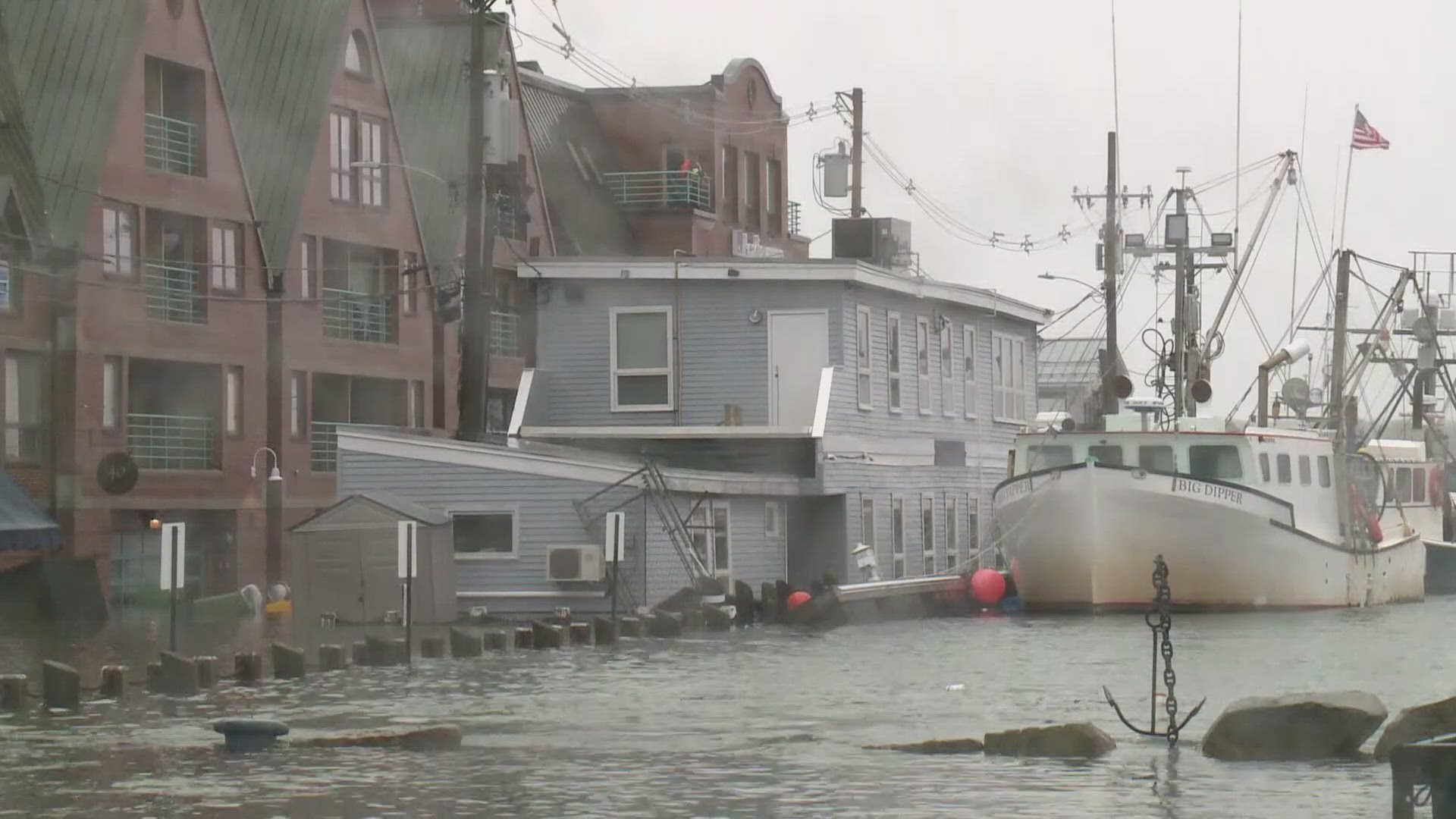PORTLAND, Maine — All was quiet Monday in Portland's Old Port.
On the federal January holiday, traffic was manageable, and the sidewalks were sparsely populated with people walking about.
A family of visitors in town from Boston and Costa Rica posed for photos in front of a giant Christmas tree built out of lobster traps on the wharf at Porthole Restaurant & Bar. If one looked close enough, they could see remnants of the danger from two days before.
On that day, John Jabar stood on the planks where the family was standing. He described watching the tide rise so high, the massive two-story tour boat he also owns almost floated up and onto the wharf.
"It was a long weekend. A lot of hours, a lot of cleanup, and a lot of waiting," Jabar exhaled. "It was a historic weekend. There’s not a lot you can do when the tide comes in like that. And we had to do a lot of waiting, hoping, and a lot of cleanup."
He said he's thankful to welcome visitors again. After a snowstorm on Jan. 7, and pounding rain Jan. 10, during the storm three days later Portland experienced its highest recorded sea level ever.
Ri Ra Irish pub had water threatening a side door but not much farther, assistant general manager Tony Rogers. Once realizing his business would largely be spared, he said he checked on Flatbread, which shares a wall with Ri Ra, and Scales, one of the city's most lauded restaurants, which sits much farther down its wharf toward the ocean.
According to Ri Ra's lore, every piece of its interior was refurbished in Ireland, shipped to the U.S., and assembled into its current form. Only one building in Portland can claim that architectural history, but each wharf and pier has weathered centuries of storms and welcomed decades of tourists and locals alike.
"The Old Port down here, on Commercial Street, we’re kind of like a family," Rogers said. "Everyone looks out for each other."
Mike Alfiero co-owns Harbor Fish Market, which is across the street from Porthole. He and his staff dealt with limited flooding in the end of the building closest to the water and were sweeping up seaweed in the parking lot when we arrived Monday afternoon.
"My concern is the future," Alfiero said. "I mean ... are we gonna be seeing this on a regular basis? That’s pretty scary."
Employers were also navigating something else this week. When Democratic Gov. Janet Mills declared a state of civil emergency on Jan. 11, it triggered a Portland hazard pay statute, requiring businesses to pay employees at least one-and-a-half times the minimum wage, bringing that to $22.50 per hour for untipped workers and $11.25 for tipped workers.
Rogers said Ri Ra ownership was prepared for the pay bump, impacting mostly tipped workers there. Alfiero said he goes "up and beyond" for his non-tipped employees, saying they were already well paid with great benefits. The statute keeps hazard pay in place for the duration of the declared emergency. Mills' office said at the time it would last one week. With the storm well past, Alfiero believed Portland's statute likely wasn’t clearly thought through for cases like this.
"You’ve got businesses now that are struggling because of damage to their properties, and we lost business all day," he said of Saturday. "And I’ve got to pay hazard pay to employees who aren’t in any hazard. I mean, there is no hazard right now for them."
While Portland employers dealt with their temporary, new payroll, Old Port business leaders finished cleaning up and made new flooding defense plans. Sitting on some of the most desirable real estate in the country, they hoped the tide would never again come as high as it did on Jan. 13.
They weren't willing to bet on it.

